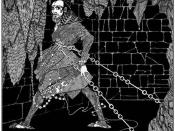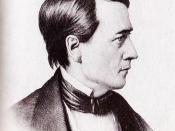Well known as a master of nineteenth-century horror, Edgar Allen Poe was at his literary best when he wrote the tales that transport the reader to the inner workings of the insane mind. Nowhere is this more evident than in his classic tale of revenge, " The Cask of Amontillado." The reader hangs on every word of the evil Montressor as he exacts revenge on the unfortunate Fortunado for an unnamed insult. Using this story as a vehicle foe what Frank Magill calls his own "morbid fear of premature burial," Poe employs verbal irony to make his point (334). Getting back at someone may be sweet in theory, but in reality, it is far from it. Poe's clever use of irony in this tale highlights the notion of revenge, as a motive that creates ultimate loss for all participants.
Probably the most controversial form of verbal irony is the hidden meaning of Montersors last words to his victim, "for the love of God."
Exclaims Fortunado(Poe 92) "Yes....for the love of God" returns Montresor. (Poe 92.) Kathryn Montgomery Harris says that this is part of Monterssors Cathloc motive, in essence he commits the crime for the love of God.(Nesbitt 320) Bruce Kirkham, however focuses on the family insults that cause Montressor to commit the gruesome acts of revenge and insists that his words are Montressors way of saying 'Your account with me is now paid in full."(Nesbitt 347)
When each of the men offers a toast to one another, it is swolen with irony, by toasting "to the dead that repose around us." Fortunado also shows that he has contempt for Montressors ancestors when he says that the family is hardly worth remembering. (Nesbit348) Ironically, Montressor hits back hard when he says, " and I drink to your long...



Irony in Poe's work
i believe this work was properly done and proven to be very helpful to me in understanding the irony in the cast of Amontillado.
1 out of 1 people found this comment useful.